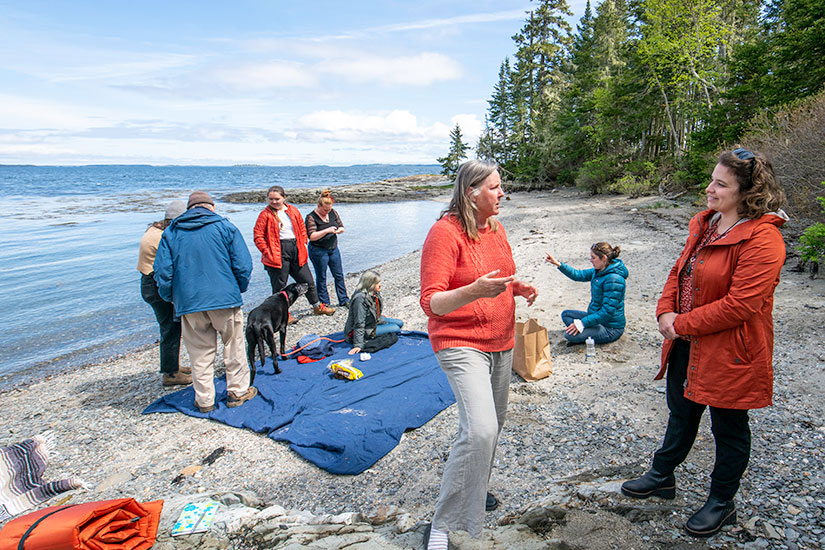Cohort 1: Islesboro, Maine
Through the NLR-managed Energy Technology Innovation Partnership Project (ETIPP), Islesboro, Maine, aimed to eliminate fossil fuel use, enhance resilience, and identify key actions to implement its energy vision.

Project Summary
 Population Size
Population Size
600 year-round/1,400 additional summer residents
 Technology Focus
Technology Focus
Rooftop and ground solar PV, microgrids
 Lead Lab
Lead Lab
Rooftop and ground solar PV, microgrids
 Regional Partner
Regional Partner
Project Results and Publications
Planning for a Sustainable and Resilient Energy System in Islesboro, Maine, Pacific Northwest National Laboratory Presentation (2023)
Planning for a Sustainable and Resilient Energy System – Islesboro, Maine, Pacific Northwest National Laboratory Technical Report (2023)
It is expected that atmospheric shifts will affect Maine islands, including Islesboro, in several ways, such as increased storm frequency and intensity and temperature changes that will impact energy use for heating and cooling. Rising sea levels may also have a unique and concerning impact on Islesboro. The island has two larger land masses to the north and south—both with residential and commercial buildings—connected by a narrower land mass known as the Narrows. The ferry terminal is located on the southern part of the island at Grindle Point. If rising sea levels overtook the Narrows or Grindle Point, the island would be dissected, and both power and transportation would be cut off.
The Islesboro Energy Committee (IEC), the community lead for this project, worked with Pacific Northwest National Laboratory and Sandia National Laboratories through ETIPP to identify energy challenges and opportunities. Islesboro community stakeholders requested a techno-economic analysis of power systems that could serve as alternatives to the utility in different load scenarios as well as an implementation roadmap.
Project Outcomes
National laboratory experts worked with Islesboro to develop a report on existing conditions on the island, a hazard and resilience risk assessment, and an opportunity assessment.
The project found that fossil fuel used to generate heat and hot water in buildings represented the majority (75%) of energy use and around 50% of emissions in Islesboro. The community identified 18 critical buildings—places that provide essential services during emergencies—on the island, only six of which had a backup power source. Through the ETIPP process, 20 solar photovoltaic (PV) systems were documented on 16 private homes, three municipal buildings, and one private business on Islesboro, representing less than 0.5% of the buildings on the island.
The IEC also documented the use of energy conservation measures on the island in 2018 and found limited uptake at that time—only 15% of year-round homes had window upgrades, and less than 3% had heat pumps. Energy conservation measures were even lower in seasonal homes.
To address Islesboro's goal to reduce fossil fuel use on the island, ETIPP provided technical information and potential steps for the IEC to continue the community engagement and education process to help promote energy conservation measures and connect with other islands to learn about models that may be applicable to Islesboro. The IEC applied for and was awarded a U.S. Department of Energy Office of Clean Energy Demonstrations Energizing Rural Communities Prize to begin this work.
ETIPP also helped develop recommendations for expanding building electrification measures on the island and provided technical information to inform next steps for increasing on-island renewable energy generation. Some actions can be taken in the short term, with support from the prize, to educate the community about renewable energy.
To address Islesboro’s goal to improve infrastructure conditions and boost energy resilience, ETIPP technical assistance recommended short-term engagement with the island’s electric power provider—Central Maine Power—to implement resilience measures. A series of steps around backup power generation can also be explored during the next 1–2 years. The technical report also provides options for enhancing energy resilience through multiple scenarios.
Key Takeaways
Effective and clear communication at all levels is foundational to the success of ETIPP. Communities are experts on their dynamics, priorities, challenges, and strengths. Trust between communities and external stakeholders is built through developing strong processes, engaging in deep listening, and taking time for reflection. Technical experts have a wealth of resources to offer to communities, but these resources are most effective when they follow active listening and clarification of community priorities and when experts communicate in clear and understandable language.
The IEC also learned the importance of internal organization. The committee functioned optimally when a main point of contact was identified and when meeting materials and notes were communicated to the entire group after meetings.
Opportunities and Impacts
The IEC is working with municipal buildings on energy efficiency measures. The committee was awarded the Office of Clean Energy Demonstrations Energizing Rural Communities Prize to continue its work to engage partners and community stakeholders around their energy goals. IEC also hosted a renewable energy conference on Oct, 14, 2023.
The Island Institute will support the IEC as appropriate to identify energy efficiency incentives and contractors for energy efficiency projects.
Additional Information
2023 Conference Materials, Islesboro Energy Team (2023)
Energy Resilience Planning Begins in Eastport and Islesboro, Island Institute (2021)
Islesboro Energy Committee Wins $100k DOE Prize, The Republican Journal (2023)
Islesboro Event Offers Energy Stories, Island Institute (2022)
Share
Last Updated Dec. 7, 2025
